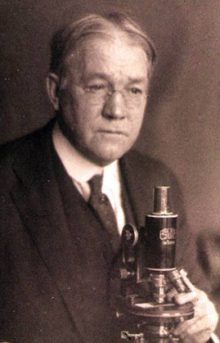Joseph Colt Bloodgood
American surgeon and medical educator
Joseph Colt Bloodgood (November 1, 1867 – October 22, 1935) was a pioneering American surgeon and a prominent figure in the field of surgical pathology. He is best known for his contributions to the development of surgical pathology as a distinct discipline and for his advocacy of early cancer detection and treatment.
Early life and education[edit | edit source]
Joseph Colt Bloodgood was born in Baltimore, Maryland, on November 1, 1867. He attended Johns Hopkins University, where he completed his undergraduate studies. Bloodgood then pursued a medical degree at the Johns Hopkins School of Medicine, graduating in 1891. During his time at Johns Hopkins, he was heavily influenced by the work of William Stewart Halsted, a pioneer in surgical techniques and one of the "Big Four" founding professors at Johns Hopkins.
Career[edit | edit source]
After completing his medical degree, Bloodgood joined the staff at Johns Hopkins Hospital, where he worked closely with Halsted. He quickly became known for his meticulous surgical techniques and his interest in the pathological aspects of surgery. Bloodgood's work in surgical pathology helped establish it as a critical component of surgical practice, emphasizing the importance of understanding the pathological basis of diseases to improve surgical outcomes.
Contributions to surgical pathology[edit | edit source]
Bloodgood was instrumental in developing the concept of "frozen section" pathology, a technique that allows for rapid microscopic analysis of tissue samples during surgery. This innovation enabled surgeons to make immediate decisions about the extent of surgical intervention required, particularly in cancer surgeries. His work laid the foundation for modern intraoperative consultation practices.
Cancer research and advocacy[edit | edit source]
A significant portion of Bloodgood's career was dedicated to cancer research and advocacy. He was a strong proponent of early detection and treatment of cancer, emphasizing the importance of regular medical examinations and the use of biopsy to diagnose cancer at an early stage. Bloodgood's efforts in this area contributed to the broader acceptance of biopsy as a standard diagnostic tool in oncology.
Legacy[edit | edit source]
Joseph Colt Bloodgood's contributions to medicine, particularly in the fields of surgical pathology and oncology, have had a lasting impact. His work helped shape modern surgical practices and improved the understanding of cancer diagnosis and treatment. Bloodgood's emphasis on early detection and the integration of pathology into surgical decision-making continue to influence medical practice today.
Related pages[edit | edit source]
Search WikiMD
Ad.Tired of being Overweight? Try W8MD's physician weight loss program.
Semaglutide (Ozempic / Wegovy and Tirzepatide (Mounjaro / Zepbound) available.
Advertise on WikiMD
|
WikiMD's Wellness Encyclopedia |
| Let Food Be Thy Medicine Medicine Thy Food - Hippocrates |
Translate this page: - East Asian
中文,
日本,
한국어,
South Asian
हिन्दी,
தமிழ்,
తెలుగు,
Urdu,
ಕನ್ನಡ,
Southeast Asian
Indonesian,
Vietnamese,
Thai,
မြန်မာဘာသာ,
বাংলা
European
español,
Deutsch,
français,
Greek,
português do Brasil,
polski,
română,
русский,
Nederlands,
norsk,
svenska,
suomi,
Italian
Middle Eastern & African
عربى,
Turkish,
Persian,
Hebrew,
Afrikaans,
isiZulu,
Kiswahili,
Other
Bulgarian,
Hungarian,
Czech,
Swedish,
മലയാളം,
मराठी,
ਪੰਜਾਬੀ,
ગુજરાતી,
Portuguese,
Ukrainian
Medical Disclaimer: WikiMD is not a substitute for professional medical advice. The information on WikiMD is provided as an information resource only, may be incorrect, outdated or misleading, and is not to be used or relied on for any diagnostic or treatment purposes. Please consult your health care provider before making any healthcare decisions or for guidance about a specific medical condition. WikiMD expressly disclaims responsibility, and shall have no liability, for any damages, loss, injury, or liability whatsoever suffered as a result of your reliance on the information contained in this site. By visiting this site you agree to the foregoing terms and conditions, which may from time to time be changed or supplemented by WikiMD. If you do not agree to the foregoing terms and conditions, you should not enter or use this site. See full disclaimer.
Credits:Most images are courtesy of Wikimedia commons, and templates, categories Wikipedia, licensed under CC BY SA or similar.
Contributors: Prab R. Tumpati, MD

